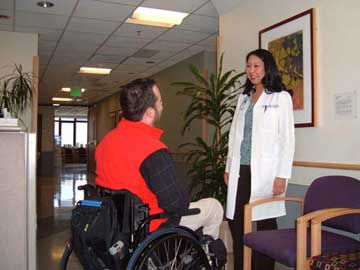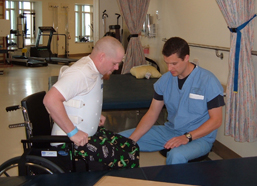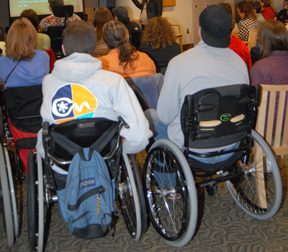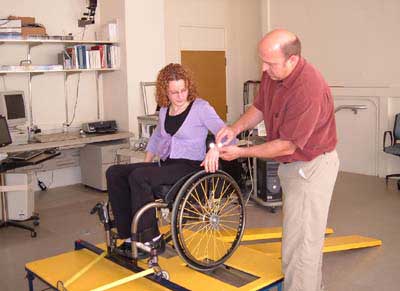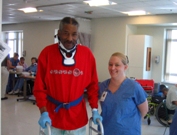SCI Forum Reports
Swimming and Yoga
May 10, 2005
Swimming
Yoga
Swimming
Kiko Van Zandt, RN , a rehabilitation nurse at Children's Hospital and Regional Medical Center (CHRMC) in Seattle, is unapologetically passionate about getting people to start swimming. She teaches and coaches disabled swimmers, and went to Athens with the US Paralympics swim team in 2004 (swimmers won 35 of the 88 U.S. medals). She swam competitively in college and has continued to do so throughout her life.
"While I come from a competitive background personally, I'm here today because I really just want to get you guys in the water," she told the audience. "I want you to feel comfortable and safe in the water, and to enjoy it." Her motto? "Swimming is the right choice!"
Why swim?
Van Zandt provided a long list of benefits of swimming for everyone, regardless of ability or disability:
- It's a lifelong sport- you can start at any age (as early as infancy), and continue through old age.
- It's good for your physical health- improves cardiovascular fitness, muscle tone, joint health, range of motion, respiratory health, sleep, and weight control.
- It's good for your mental health- relieves stress, promotes relaxation.
- It's good for your social life- you can meet people through teams, classes, or just regular pool sessions. Sharing a common interest or activity like swimming promotes camaraderie.
- Goal setting- as with any endeavor, setting goals can be an important motivator and provides a sense of accomplishment, and in swimming you can set long-, short- and in-between goals.
- Organizational discipline- a regular swim schedule can help you organize your time. "As a college athlete, the discipline required for swimming helped me stay organized with all aspects of college life," she said.
- Opportunities for travel, networking, furthering your education- whether it's going to the Paralympics in Athens or to a regional meet, swimming on a team can expand your horizons. Competitive swimmers can receive athletic scholarships for college.
- The best of both worlds- swimming offers the advantages of both an individual (working to improve personal times promotes independence and self-esteem) and a team (working together, mutual encouragement, support) sport.
In addition, Van Zandt believes swimming is an especially good exercise choice for the SCI population because it provides the opportunity to engage in a resistance activity, to feel freedom of movement ("you're not working against gravity when you're in the water"), and to increase body awareness.
How to get started
Getting started is arguably the hardest part of any exercise program, and Van Zandt admits that working regular exercise into one's life is difficult, more so if you have a disability. "Exercise should be done to make your life better and easier," she said, "not to make it harder. You need to choose something that works for you." In her experience teaching and coaching swimming in the disabled population, the benefits of swimming far outweigh the hassles.
"Start with your local parks and recreation departments, YMCA, or disabled student services if you're a student," Van Zandt suggested. Ask about classes, sessions, and even individual lessons. "Use terms like 'adaptive aquatics' or 'disability swimming' when looking for or asking about swim programs." Some local swim schools also have programs for people with disabilities.
"Make sure you tell them you're not talking about Special Olympics activities," she warned. Special Olympics pertain to people with developmental disabilities (IQ under 75). "Be clear that you have a physical disability" and need help getting in and out of the water.
For a list of Puget Sound swimming pools , click here.
Things to know
- Water temperature -For people with SCI, the warmer the pool water, the better, "unless you're doing a really vigorous workout\." Van Zandt said. Local facilities with very warm pools include Fircrest Swimming Pool (Shoreline), King County Aquatic Center (Seattle), and Bellevue Aquatic Center (Bellevue). See resources for locations and contact information. Call ahead to inquire about pool temperatures. A thin neoprene wetsuit may help with keeping your body temperature more comfortable and also helps with flotation.
- Lifts -all pools listed in the resources have lifts for getting in and out of the water.
- Gear -aqua jog vests and life jackets can provide extra buoyancy and sense of security when you're just getting started. Aqua socks protect your feet from scrapes against the pool walls, and also help with buoyancy. Some pools have small inner tubes to keep your ankles buoyant, flotation "noodles" to place under the body, and poolside mats to reduce slipperiness. Ask about equipment when you call. See resources for swimming accessories vendor.
- Health status -get a physical before you start swimming. Make sure you swim within your target heart rate. Ask your physician or a trainer about this-target heart rates for people with SCI differ from the general population.
- Water hygiene -before getting in a pool, make sure you have your bladder and bowel program under control and have no open wounds.
- Sweat -you can still sweat above your lesion even while in the water, so remember to drink water.
- Safety -keep your health and emergency information with you when you go to a pool and wear a medical alert bracelet with information about any precautions you have, such as risk for autonomic dysreflexia.
Need help?
Van Zandt is happy to give advice and encouragement to anyone having trouble getting started. Contact her at 206-987-2182 or kiko.vanzandt@seattlechildrens.org .
Swimming resources
- Puget Sound Swimming Pools-a list of public swimming pools in the greater Seattle area.
- Swimwear and accessories-Kast-a-way Swimwear, a mail order and internet vendor or a wide variety of swimwear and products; 800-543-2763 or www.kastawayswimwear.com/ .
Yoga
Laura Yon-Brooks, MA , combines an advanced degree in sports medicine with extensive yoga training and has taught yoga to cancer patients at the UW Medical Center and the Seattle Cancer Care Alliance for five years. She practices a style of yoga called viniyoga, ( vini means "to adapt")which "can be adapted to the needs of the individual, as opposed to trying to adapt the person to the yoga."
Working with people who have serious illness or injury, she finds that with viniyoga, "we can always do something, even if a patient is hooked up to an IV or too tired to get out of bed. This yoga isn't just the postures, it's breathing, mindfulness, movement, awareness and visualization. We use the breath to quiet the mind." What it feels like is more important than what it looks like, "so we adapt the poses according to how it feels for the individual and so the individual can get some benefit. viniyoga really is for every body."
Yon-Brooks took the audience through a short viniyoga session, with a series of stretches and mental relaxation and breathing exercises.
Yoga Resources
- Yoga for Life: A Practical Manual of Breath and Movement for Every Body by Margaret and Martin Pierce ($19.95, Rudra Press, 1999) describes a variety of postures and their modifications, including modifications for wheelchair users.
- American Viniyoga Institute , located in Hawaii, has general information about viniyoga on its Web site ( http://www.viniyoga.com/ ) and lists U.S. viniyoga teachers (for the Washington State list, go to http://www.viniyoga.com/?cn=who_directory_teach#Washington ). Toll-free phone: 800-572-1414.
- The Multiple Sclerosis Association of King County holds regular yoga classes in different areas of King County, open to anyone. For more information, contact them at 753 N 35 th, Suite 208, Seattle, WA 98103; 206-633-2606; http://www.msakc.org/General/YogaClasses.htm .

